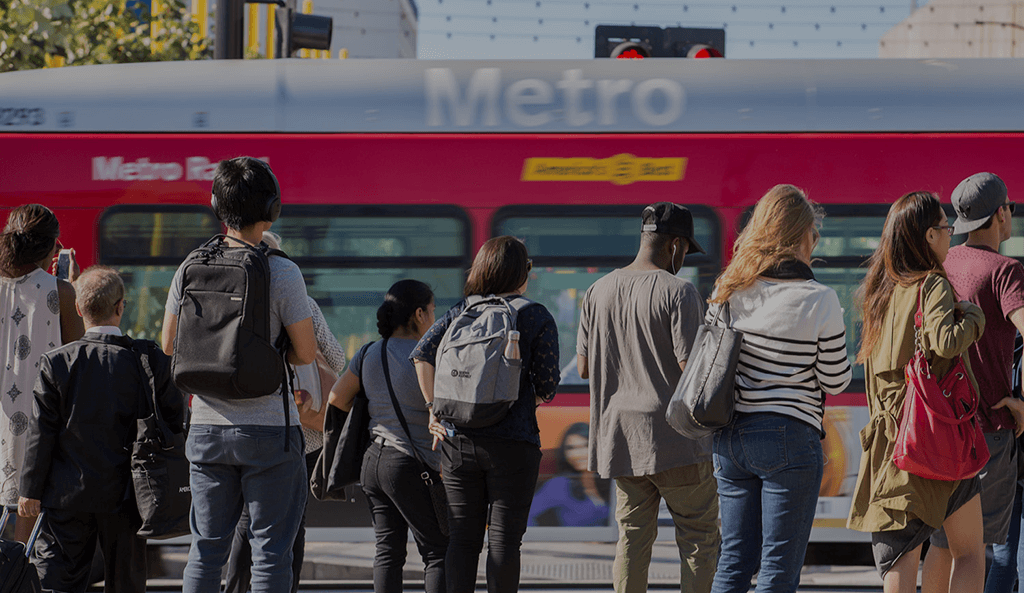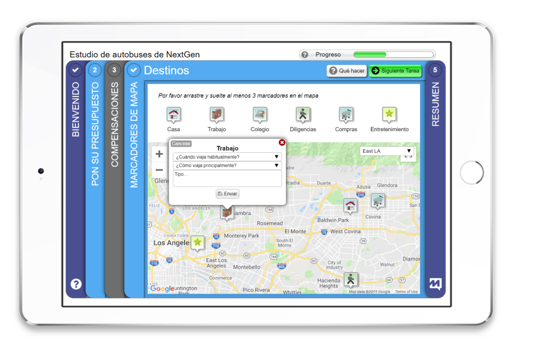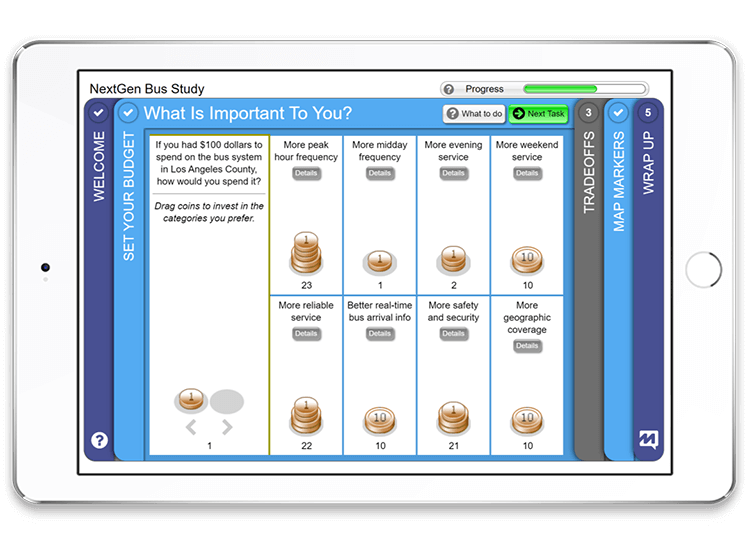LA Metro Engages 6,900+ for NextGen Bus Study!
“We got thousands of folks responding and it was ideal in terms of the results: 60% of the folks who responded to the MetroQuest survey were people of color. They were low income residents who actually depend tremendously on our system.” – Robert Cálix, Senior Manager, Transportation Planning in Communications, Los Angeles County Metropolitan Transportation Authority
We’re inspired by LA Metro’s equitable public engagement!
While agencies aim for true diversity when engaging the public, LA Metro achieved truly impressive numbers. Of the 6,900+ Angelenos they engaged with MetroQuest, 60% were people of color with a balance of genders, age groups, zip codes, and income levels. WOW! LA Metro was able to:

Los Angeles County Metropolitan Transportation Authority
The Los Angeles County Metropolitan Transportation Authority (LA Metro) is unique among the nation’s transportation agencies. LA Metro serves as transportation planner and coordinator, designer, builder, and operator for one of the country’s largest counties, home to nearly 10 million people.
In 2018, LA Metro began the NextGen Bus Study aimed at reimagining the bus network to be more relevant, reflective of, and attractive to the diverse needs of local transit riders. The bus network had not been significantly updated in 25 years. Over that time, LA County had added a million plus residents, many local communities had transformed, and travel patterns had changed. When public engagement began in 2019, LA Metro placed high importance on engaging the breadth of the community they serve. It was time to reimagine the bus system to be more relevant to the needs of all people in LA County.
CHALLENGE: How to redesign a modern bus network that achieves equity?
While many transit agencies struggle to engage traditionally underrepresented audiences, the team at LA Metro was determined to gain diverse public input. Younger demographics, older adults, women, people of color, and lower income families are frequently missing from engagement efforts on transit planning projects. Not only does this under-representation make it difficult to defend the results, these hard to reach populations also make up the highest percentage of transit riders.
For LA Metro’s NextGen Bus Study, the team sought to hear from the voices that are critically important to the creation of a transit system that truly meets the needs of people who need it most. Robert Cálix, Senior Manager of Transportation Planning in Communications for LA Metro, explained the importance of achieving representative diversity in involving the public in the NextGen Bus Study.
“We’re very diverse – we have 200 different cultures from around the world living in LA County. Our Board of Directors wanted to make sure that we reached not only as many people as possible, but also those folks who are hard to reach, who feel they have been left out of the process, or historically, have been underrepresented.”
As the team at LA Metro examined every one of LA Metro’s 150 bus lines and 13,978 bus stops to determine the best system redesign possible, they worked with Arellano Associates to involve the public in planning. With equity high on the agenda, they offered multiple forums to engage the community meaningfully and actively in defining, measuring, and acting on equitable outcomes for all transit riders.
SOLUTION: LA Metro Engaged nearly 7,000 Angelenos with MetroQuest!
LA Metro achieved outstanding public engagement with MetroQuest. The team monitored survey results early in the process and took MetroQuest to the streets to reach underrepresented groups. Robert personally met with residents of all genders, ethnicities, and income levels.
“Not only did we offer MetroQuest to folks in the privacy of their own home, but when we went out and worked with folks who needed us to go individually to their place of worship or to their place of play or to their place of school. We were able to bring folks into a NextGen Bus vehicle and offered the MetroQuest platform so they could tell us what they felt was important.”
The public engagement numbers speak for themselves. LA Metro engaged over 6,900 local residents using MetroQuest, with online surveys available in both English and Spanish. Robert commented on the significance of the results:
“The NextGen bus study is a countywide effort. We have 150 bus lines carrying 850,000 people a day. To be able to gauge how they feel about our system, we needed to engage lots of folks and the MetroQuest tool allowed us to do that. It’s one of various tools that we used, but it was a very important one because it got us nearly seven thousand responses. It was ideal in terms of the result.”
In addition to engaging the public online, the team also held a series of 20 public in-person workshops that opened a dialog between LA Metro service planning and more than 1,000 additional residents.

LA Metro Webinar
True Diversity: LA Metro’s Surprising Path to Equity in Public Engagement
LA Metro and Arellano Associates share how to achieve true diversity and engage 1,000's of residents for your next transit plan.
LA Metro gamified public engagement in long term transit planning!
Not all online survey tools can effectively involve the public in planning, especially in long term transit planning. MetroQuest surveys weave in microlearning and games into the online engagement experience, putting transit riders in the planning seat.
LA Metro chose wisely in selecting its MetroQuest templates to design the NextGen Bus Study survey. The team used the ‘Budgeting’ game to help prioritize investments in transit. It used several ‘Tradeoff’ questions with vivid pictures to gain public preferences for service improvements. The team also used the MetroQuest ‘Map Markers’ to identify travel patterns by location, time, and mode. Robert described the online engagement experience:
“We were able to engage folks through a scenario, kind of like a game, where we asked people; if you had $100 to invest in transit, what would you invest it in? Would you invest it in more service in the morning? Or would you like us to spend more on bus stop amenities? Or should we invest it in late night service? Those kinds of scenarios were very important for us and MetroQuest allowed us to get that kind of input to help us with our service design changes.”
MetroQuest survey results delivered technical input for transit enhancements.
The MetroQuest surveys yielded 129,300+ data points to better inform the LA Metro bus system design. MetroQuest is optimized to give decision makers the confidence they need to make critical public investment decisions. That means both quantity and quality – engaging thousands of people from a broad demographic and collecting quantifiable, trustworthy input to better support planning decisions. Robert commented on the robust nature of the public input his team collected.
“The input that we got is helping us look at our redesign efforts and make better decisions. We were able to show our board of directors how the tool helped us quantify and visually show what people are telling us. We’re now putting lines on a map. That’s exciting. We’re looking at each individual line with the public input and we can see how to better redesign our bus system in LA County.”
Collecting a high level of technical information with MetroQuest for the LA Metro planning team is allowing them to build a draft service plan that truly reflects the transit needs of Angelenos as uncovered during the public engagement phase.
RESULT: A green light from the LA Metro Board of Directors!
This broad engagement translated into stronger community and political support for bus services and provided new insights into community priorities. LA Metro is now developing a draft bus service plan for a more useful bus network that fits the modern lifestyle of Angelenos, integrates with all the ways they travel throughout LA County, and gets them to where you need and want to go … all with flexibility for the future. The team looks forward to sharing this draft bus service plan with the public in early 2020.
“We got thousands of folks responding and it was ideal in terms of the results: 60% of the folks who responded to the MetroQuest survey were people of color,” reiterated Robert. “They were low income residents who actually depend tremendously on our system. They are our core ridership. When the Board of Directors saw the level of engagement, the penetration, how deep we were able to go into those communities, they believed this project had integrity in the results, and they gave us the green light to go to the next step.”
LA Metro is one of hundreds of transit agencies, metropolitan planning organizations, regional planning agencies, and state departments of transportation to use MetroQuest surveys to maximize public participation, collect informed input, and deliver actionable results in support of better planning decisions. We would like to congratulate the entire team at LA Metro and Arellano Associations on your truly outstanding and equitable public engagement results!

